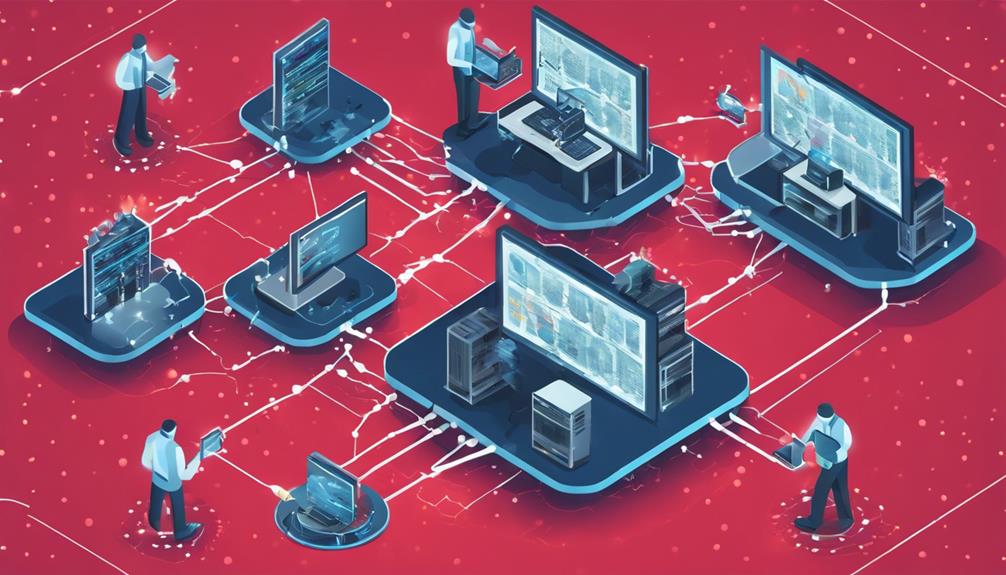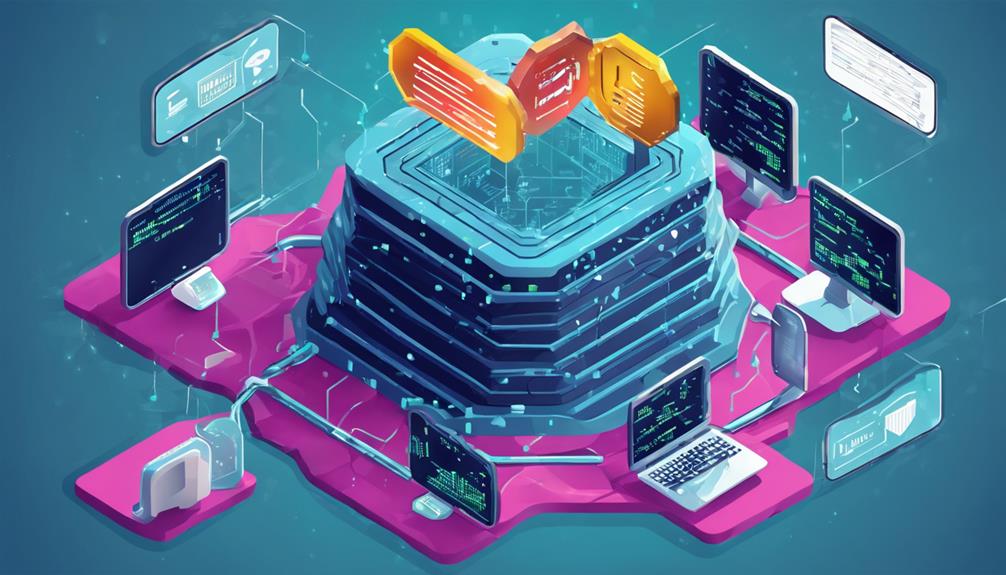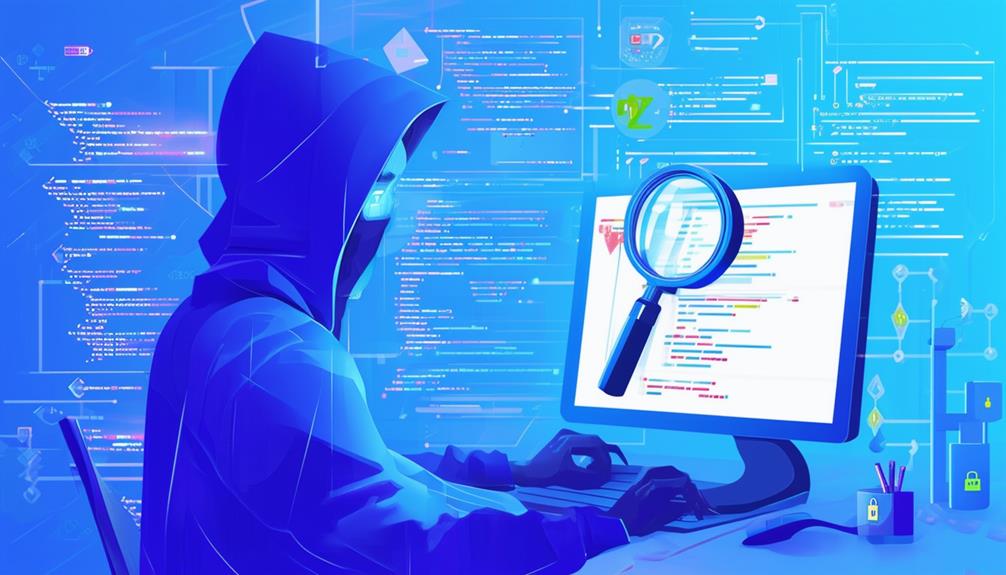Ethical hacking is pivotal in safeguarding against Denial of Service (DoS) attacks by pinpointing vulnerabilities and fortifying security measures. Understanding common attack techniques like ICMP floods, SYN floods, and buffer overflow exploits is essential. Implementing defense strategies such as firewalls, intrusion detection systems, and DDoS mitigation services can mitigate risks. Ethical hackers play an important role in enhancing system resilience and collaborating on updated security measures. Prioritizing cybersecurity tools, regular system updates, and incident response plans further fortify against potential threats. Essential practices to protect against DoS attacks are continually evolving, ensuring robust defense mechanisms are in place.
Key Takeaways
- Implement network monitoring tools to detect DoS attacks early.
- Utilize traffic filtering mechanisms to block malicious traffic effectively.
- Update systems regularly to patch vulnerabilities and prevent attacks.
- Collaborate with ethical hackers to identify and strengthen security measures.
- Develop incident response plans for swift and coordinated reactions to minimize impact.
Understanding Denial of Service Attacks
What exactly are Denial of Service (DoS) attacks and how do they function to disrupt network services?
Denial of service attacks, commonly referred to as DoS attacks, are malicious activities aimed at overwhelming systems with an excessive amount of traffic or resource requests. Attackers may employ various techniques such as UDP floods, ICMP floods, and SYN floods to disrupt network services, causing financial losses, downtime, and harm to an organization's reputation.
Mitigation strategies for DoS attacks involve implementing network monitoring tools, traffic filtering mechanisms, and enhancing overall security measures to detect and prevent such attacks effectively. It is essential for individuals engaging in ethical hacking practices to comprehend the legal and ethical implications associated with conducting DoS attacks.
Common DoS Attack Techniques

Exploring the various techniques employed in common Denial of Service (DoS) attacks reveals the diverse methods used by malicious actors to disrupt network services. Flooding attacks, such as ICMP floods and SYN floods, inundate systems with excessive traffic, causing service disruption by overwhelming the network's capacity.
Buffer overflow attacks take advantage of software vulnerabilities by flooding a system with more data than it can handle, leading to resource exhaustion and potential crashes. ICMP floods, specifically, flood targets with ping requests, consuming resources and slowing down network operations.
Application layer attacks target specific services or applications, exploiting weaknesses to exhaust resources and disrupt normal operations. Understanding these common DoS attack techniques is vital for implementing effective defense strategies to safeguard against potential cyber threats.
Defense Strategies Against DoS

To mitigate the impact of Denial of Service (DoS) attacks, organizations can implement a range of defense strategies aimed at safeguarding their network infrastructure. Installing firewalls and intrusion detection systems can help in detecting and blocking DoS attacks before they reach the intended target.
Load balancers play an important role by effectively distributing incoming traffic, thereby reducing the impact of DoS attacks on specific systems. Employing Distributed Denial of Service (DDoS) mitigation services provides specialized protection against sophisticated and high-volume attacks that traditional defenses may struggle to handle.
Regularly updating software and systems is crucial to patch vulnerabilities that malicious actors could exploit in a DoS attack. Additionally, organizations should create incident response plans to ensure a swift and coordinated reaction to minimize the impact of a DoS attack.
Ethical Hackers can also be instrumental in identifying potential vulnerabilities and testing the effectiveness of defense strategies against DoS threats.
Importance of Ethical Hacking in Protection

Ethical hacking plays a crucial role in guaranteeing proactive defense mechanism against Denial of Service (DoS) attacks by identifying vulnerabilities and strengthening organizational security measures. Certified Ethical Hackers play a critical role in safeguarding systems by proactively testing for weaknesses and assisting in fortifying defenses against potential DoS threats. By understanding the principles of ethical hacking, organizations can implement robust security measures to prevent and mitigate the impact of malicious attacks.
The importance of ethical hacking lies in its ability to enhance system resilience and protect against vulnerabilities that could be exploited in DoS attacks. Through authorized testing conducted by ethical hackers, organizations can bolster their system defenses and stay ahead of potential threats.
Collaborating with ethical hackers guarantees that security measures are continuously updated and aligned with the evolving landscape of cybersecurity threats, safeguarding systems against DoS attacks and other malicious activities. Ethical hacking serves as a key component in the ongoing effort to shield organizations from the damaging effects of cyber threats.
Mitigating DoS Risks Through Cybersecurity

Mitigating the risks of Denial of Service (DoS) attacks through effective cybersecurity measures is essential for safeguarding organizational systems and maintaining operational continuity. Cybersecurity tools like firewalls and intrusion detection systems play an important role in detecting and blocking malicious traffic that could lead to DoS attacks.
Load balancers are another valuable asset in distributing incoming traffic across multiple servers, preventing a single target from being overwhelmed. Overprovisioning bandwidth can also help in handling sudden spikes in traffic during potential DoS attacks.
Additionally, utilizing DDoS mitigation services can provide specialized expertise in identifying and mitigating DoS threats efficiently. Updating software and systems regularly is crucial to patch any vulnerabilities that attackers might exploit to launch DoS attacks.
Creating incident response plans ensures that organizations can respond promptly and effectively to mitigate the impact of DoS attacks on their network devices and services. By implementing these cybersecurity measures, organizations can better protect their systems from the disruptive consequences of DoS attacks.
Frequently Asked Questions
What Are the Defenses for Dos Attacks?
Defenses against DoS attacks include implementing firewalls, intrusion detection systems, load balancers, and DDoS mitigation services. Regular software updates are vital to patch vulnerabilities. Incident response plans guarantee a coordinated reaction to mitigate attack impact.
How Can We Protect Against DDOS Attacks?
To safeguard against DDoS attacks, deploy robust defense mechanisms like firewalls, intrusion detection systems, and load balancers. Implement content delivery networks (CDNs) for traffic distribution. Collaborate with ISPs for traffic filtering. Maintain updated software and establish an incident response plan for mitigation.
What Can Protect Your Network From Dos Attacks?
Mitigating Denial of Service (DoS) attacks requires a multi-layered approach. Implementing firewalls, intrusion detection systems, load balancers, DDoS mitigation services, and ensuring regular software updates are crucial. Incident response plans play an important role in minimizing network downtime.
What Is Denial of Service in Ethical Hacking?
Denial of Service in ethical hacking refers to intentional actions aimed at disrupting network services. Ethical hackers analyze these attacks to identify weaknesses and enhance defenses. Understanding DoS is essential for fortifying systems against potential threats and ensuring network security.
Conclusion
To sum up, ethical hacking plays a vital role in protecting against denial of service (DoS) attacks by identifying vulnerabilities and implementing defense strategies.
By understanding common attack techniques and utilizing cybersecurity measures, organizations can mitigate the risks of DoS attacks.
It is essential to stay vigilant and proactive in safeguarding digital assets from potential threats.
As the saying goes, 'prevention is better than cure,' and taking preventative measures against DoS attacks is key to maintaining a secure online environment.









